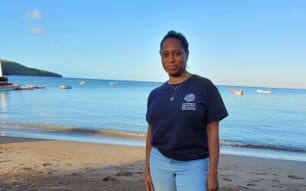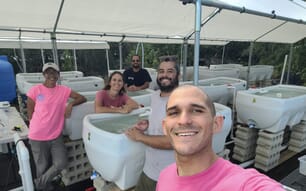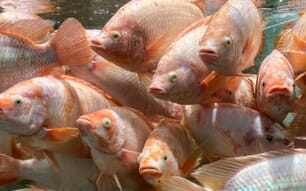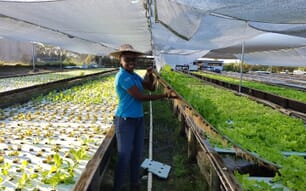Here she discusses the challenges of unemployment on a small island that led to her career in aquaculture, and her vision for the industry’s future in Jamaica.
Briefly describe your aquaculture career
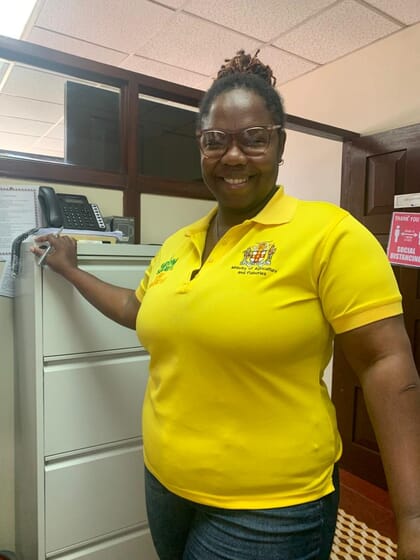
Bennet got her start in aquaculture when she took a job as a pond operator
I received my diploma in general agriculture from the College of Agriculture Science and Education (CASE), in Portland Jamaica in 2006. Three years of trying to find my bearings and not so certain what life held for me, things started looking up. I wanted to find a job that was “agriculture-based.” Persistence led me to the Ministry of Agriculture and Fisheries. An opportunity as a pond operator came up at the then Fisheries Division. Young and eager to start working, I applied and was successful.
What inspired you to start in aquaculture?
I didn’t find aquaculture, aquaculture found me! My life’s dream was to be a veterinarian. Even while in the first year of working with the Ministry of Agriculture and Fisheries, I started looking for vet schools but, over time, the truth is I fell in love with aquaculture. The potential for growth and development had me hooked. I enjoyed interacting with the farmers responsible for putting fish on my plate. I was learning and understanding the production processes for tilapia. Earlier I had been exposed to ornamental fish rearing. A whole new world of fish and fish production had been opened to me. I began to appreciate the true potential and nature of aquaculture.
A transfer to the extension department soon took place and I began to observe my colleague and friend Stacy-Ann Gray. I describe her as a world changer and woman of vast experience, knowledge and adventure. She was trained in general aquaculture in Florida with a background in ornamental fish production, mariculture (shellfish and finfish culture) and learned in depth the culture of tilapia on the job at the Fisheries Division. Soon after, she graciously allowed me to tag along with her on some work she was doing. My heart exploded: I was fascinated; intrigued and eager to delve into another direction of aquaculture, bivalves!
Can you summarise your current work?
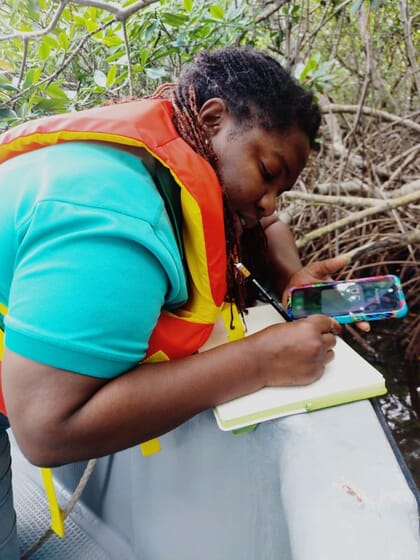
Bennet's thesis will help identify suitable areas of oyster production in Jamaica
Currently, my MSc thesis research is titled “Site selection for mangrove oyster Crassostrea rhizophorae based on growth performance and food abundance.” I am examining three specific areas and assessing water quality, growth and development of the oysters to determine the criteria that will deem an area suitable for mangrove oyster production, spat production, or grow-out purposes.
How will it contribute to the development of aquaculture in Jamaica?
I hope to help identify more areas suitable for oyster production. This will give us a better understanding of which areas to designate as mariculture production areas. The Fisheries Act (FAO, 2018) created for Jamaica, refers to the development of aquaculture management areas/zones. This study will contribute to that development objective by ensuring that we can designate, using current data, areas that are suitable for the production of mangrove oysters.
What is the size of the research facility and what species do you produce?
The Bowden Mariculture Facility of the National Fisheries Authority is roughly 1000 m2 of sea space. It is also a fish sanctuary containing the largest known stand of the mangrove oyster in Jamaica.
What is the most inspiring experience you have had working in aquaculture to date?
There are so many stories. For example, experiencing a once-incarcerated individual becoming involved in fish farming and progressing over the last five to six years; watching a group of young men push their way through extreme challenges to reap their ponds, grow their farm and continue to be actively involved in tilapia production; watching a farmer move from trial stage to now having an attractive fun fishing business; and working with a small farm managed by a woman who has consistently produced quality fish which contributes to income for the operation of and assists in feeding the wards of the Mustard Seed Community, a facility is dedicated to the residential care of children and adults with a range of developmental and physical disabilities.
What has been your greatest achievement in aquaculture?
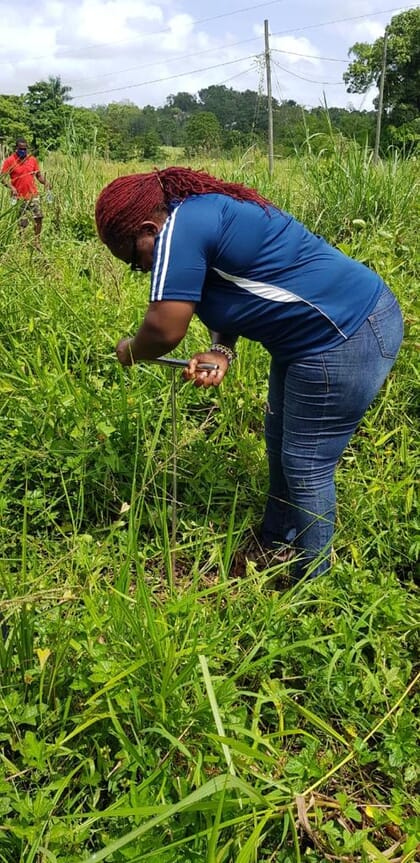
Bennet was part of a team that successfully bred Pangasius hypothalamus in Jamaica for the first time
These include watching farmers reap the rewards of tilapia farming from initial stocking to harvest at the end of six months crop cycle and being able to sample the fish that I helped guide them to grow; being part of a team that successfully bred Pangasius hypothalamus in Jamaica for the first time and being brave enough to pursue a master of science degree, something which in the past, I thought was too scary and out of my league to even attempt.
What do you enjoy most about your work?
I enjoy learning new things because aquaculture concepts are multi-faceted and dynamic, what applies for one may not necessarily work for another. However, when it works and you have grasped the concept or process, the feeling is beautiful. I also find it fascinating to engage in the process of learning. The progression of different stages, though frustrating, teaches valuable lessons in problem solving and skill enhancement. Failure is a learning experience; I am beginning to understand that it is not the end of the world, it’s just a different way of how not to do or how to adjust whatever it is your trying to achieve. I also like that this industry does allow you some creativity, you can execute a process and it may require some ingenious engineering, however in the end what you conceptualise has the potential to impact the world. Sometimes these inventions can be so simple.
What is the hardest part of your role?
Personalities do differ and from time to time there is the challenge of learning to understand people’s emotions and read conversations so that I can direct it to a positive learning outcome. Some people are stuck in their ways and would rather learn the hard way before they acknowledge that what we say has merit to it. Though you give sound advice and state clear evidence, some people just don’t listen and it can be frustrating when you know – based on other farmers’ experiences and yields – that they can do so much better. The goal, however, is to not give up but refocus how we deliver the information to make them understand the importance of applying concepts that have been tried and proven.
Have you faced any particular challenges as a woman in aquaculture?
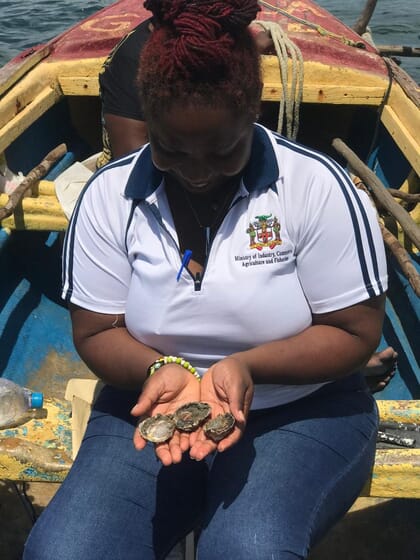
Bennet wants to see Jamaica's aquaculture sector grow and produce more local species for both domestic consumption and exports
Fortunately for me, things have been good. The farmers that I assist have confidence in my capabilities. Being a woman has not hindered my ability to perform any tasks at all, from throwing a cast net to lifting something heavy. Though Jamaica still has some perception of women and how they should operate, that is quickly changing as more and more women are part of management and decision-making roles.
What advice would you give to women looking to start a career in the sector?
There is a place here for you! Your voice matters, your ideas are not too wild; you’re not too quirky, you are qualified enough even if your beginning is not what society dictates. There is learning at every stage and phase of aquaculture production. You are not too young and not too old. You are brave enough to take on this industry, you can do well. The important thing is taking the first step!
What would be your dream role in aquaculture and do you think it is realistic to achieve?
Aquaculture developmental specialist. I want to take a species production cycle from initial stage through to end of production cycle. Using sound technical and scientific knowledge to culture and produce non-traditional local species. For example, mangrove oyster hatchery production, mud crab indoor culture, parrot fish cage culture or sea cucumber cultivation.
What is your ultimate ambition in the sector?
I want to see the aquaculture sector grow, more local species being cultured and available for the local and international market and be an even greater contributor to the country’s GDP. Schools placing further interest in the sector. Overall I want Jamaica’s sector to become sustainable, traceable; an adaptive industry capable of providing affordable, healthy, delicious seafood for all to enjoy and make a living from.

